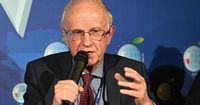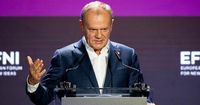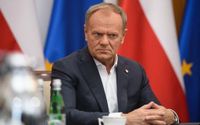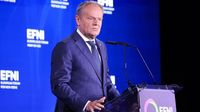On April 16, 2025, Prime Minister Donald Tusk unveiled a bold economic initiative dubbed the "Poland First" program, marking a significant shift in Poland's economic strategy. During a speech at the European Forum of New Ideas, Tusk declared that the "era of naive globalization" is coming to an end, urging the nation to adapt to a more competitive global landscape.
"If we want to achieve economic success and build a secure state, we must clearly state that Poland will not be a naive partner in the ruthless competition among egoists on global markets," Tusk asserted. This statement reflects a growing sentiment among world leaders who are increasingly prioritizing national interests over global cooperation.
Central to Tusk's announcement was the call for the "repolonization" of the Polish economy, which involves prioritizing Polish capital and entrepreneurs. He emphasized the need for strict reporting on all orders and investments within State Treasury companies, stating, "The task of managers of state-owned firms, especially in the energy sector, is to care for the interests of Poles, not necessarily to maximize the profits of the State Treasury company." This directive signifies a fundamental shift in how state-owned enterprises will operate moving forward.
Among the ambitious plans outlined by Tusk, he mentioned that 53 billion PLN from the investment in Poland's first nuclear power plant should be directed to Polish firms. He tasked Polskie Elektrownie Jądrowe with ensuring that this investment benefits local businesses. However, the feasibility of this plan raises questions, particularly since the primary contractor for the nuclear project is a consortium of American companies, Westinghouse and Bechtel.
Additionally, Tusk highlighted the importance of the Sławków logistics terminal, which he assured would be entirely Polish. This terminal is expected to play a crucial role as a hub for companies involved in the reconstruction of Ukraine, reflecting Poland's strategic positioning in the region.
In a further demonstration of his commitment to economic nationalism, Tusk announced plans to invest in Rafako, a company that recently declared bankruptcy. The intention is to pivot Rafako's operations towards the defense industry, with Tusk stating, "We decided to invest some money there to maintain this place." However, the specifics of how this transition will occur remain unclear, raising concerns about the viability of such initiatives.
Another significant aspect of Tusk's speech was his announcement of a major deregulation package set to be revealed on April 17, 2025. Deregulation is seen as a necessary step to stimulate economic growth, although critics have voiced concerns about the potential negative impacts on foreign investment and the stability of publicly traded companies.
Following Tusk's announcement, the stock market reacted sharply. Shares of Rafako surged, reflecting investor optimism about the company's new direction. In contrast, the stocks of Polska Grupa Energetyczna, Tauron, and Enea saw declines, as Tusk's remarks about prioritizing citizen interests over profit maximization raised alarms among investors.
Historically, ambitious economic plans have been a hallmark of Tusk's political career. Back in 2008, he shocked the economic community by proposing Poland's entry into the Eurozone by 2011—a goal that ultimately did not materialize. More recently, in 2021, Mateusz Morawiecki introduced the "Polski Ład," a comprehensive plan aimed at rebuilding the economy post-pandemic, which became synonymous with chaos, particularly regarding tax reforms.
Critics have begun to voice concerns about Tusk's new approach. Former Deputy Prime Minister Grzegorz Kołodko expressed skepticism, stating, "We are on the wrong path. We are spending 4.7% of GDP on military expenditures and only 0.5% on research and development." He argued that Tusk's policies reflect a militaristic approach rather than a genuine concern for Poland's economic competitiveness. Kołodko suggested that Tusk's emphasis on economic nationalism is more about political maneuvering than effective governance.
As Poland navigates this new economic landscape, the impact of Tusk's policies on domestic firms remains to be seen. The Global Business Optimism Insights study recently revealed that optimism among Polish entrepreneurs has plummeted, falling from -1 to -13 points, the lowest among 32 surveyed countries. This decline is attributed to fears regarding the implications of ongoing trade tensions and the uncertain global economic environment.
In conclusion, Tusk's "Poland First" initiative marks a decisive turn in Poland's economic strategy, reflecting a broader global trend towards nationalism. As the government seeks to repatriate capital and prioritize local interests, the success of these plans will depend on their execution and the response from both domestic and international investors. The coming weeks will be critical as the details of the deregulation package emerge and as the implications of Tusk's vision become clearer.








